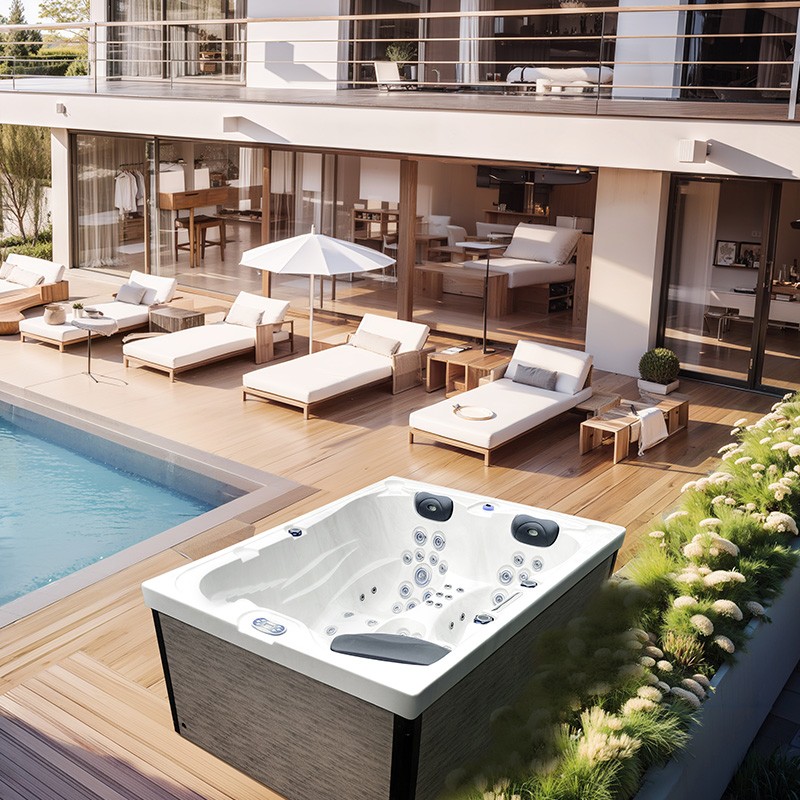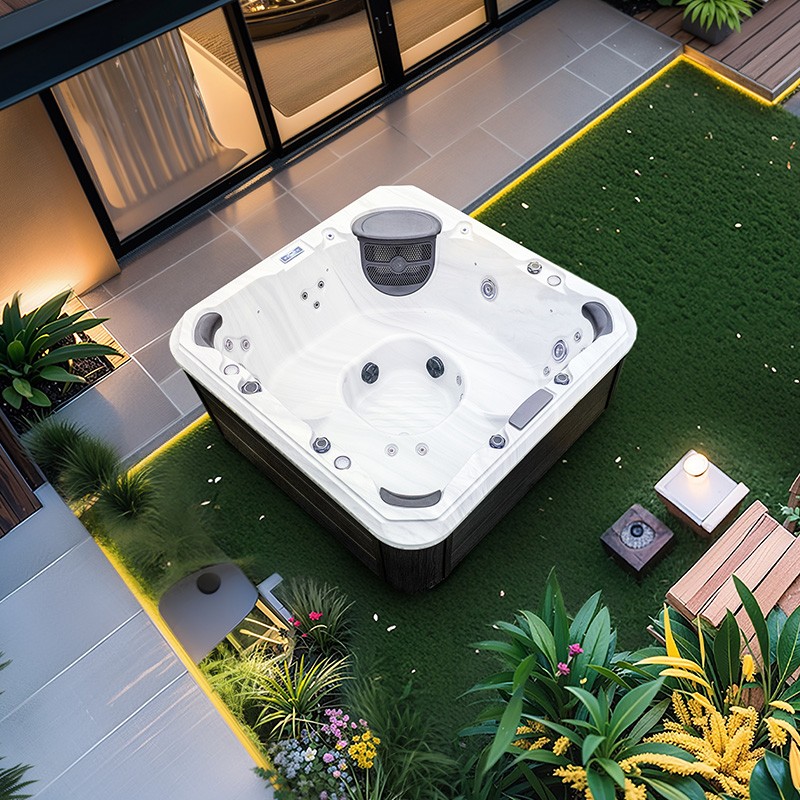
How to relieve discomfort after using a spa jacuzzi?
2025-10-03 15:30A spa jacuzzi bathtub is considered by many to be a luxurious way to relax. Combining the benefits of water massage and warm hydrotherapy, it helps relieve fatigue, relieve muscle tension, and promote blood circulation. While a spa jacuzzi bathtub can provide a comfortable and relaxing experience, prolonged or improper use can also cause some discomfort. In particular, if the water temperature is too high, the soaking time is too long, or the body reacts, users may experience dizziness, nausea, and weakness.
This article will discuss common discomfort symptoms after using a spa jacuzzi bathtub, analyze their causes, and recommend effective relief methods. By understanding these issues, users can avoid discomfort caused by improper use while enjoying the benefits of a spa jacuzzi bathtub, ensuring a healthy and safe experience.
What are some common discomforts associated with a spa jacuzzi bathtub?
1. Nausea and vomiting
The water temperature in a spa jacuzzi bathtub is typically high, and hot water, especially during prolonged use, can cause some discomfort. Nausea is a common discomfort after using a spa jacuzzi bathtub. This is because excessively high water temperatures can increase body temperature, leading to increased blood circulation and blood pressure fluctuations, which can affect the normal functioning of internal organs.
When the water in a spa jacuzzi bathtub is too hot, the body automatically responds to regulate its temperature. Blood pools on the surface of the skin, reducing blood supply to internal organs and potentially causing symptoms such as nausea and dizziness. Furthermore, prolonged exposure to hot water can increase fatigue and cause digestive discomfort.
2. Dizziness and weakness
Dizziness and weakness are also common discomforts after using a spa jacuzzi bathtub. When the water is too hot, blood rushes to the skin, causing a drop in blood pressure. Some people may experience dizziness, weakness, or even fainting. Prolonged exposure to hot water can exacerbate these discomforts, especially for those with low blood pressure or weakened cardiovascular function.
In addition, prolonged exposure to hot water can cause water loss, leading to dehydration and further worsening weakness. Dehydration can lead to electrolyte imbalances in the body, further impacting normal heart and brain function, leading to discomfort.
3. Dry Skin and Irritation
The hot water and chemicals (such as water treatment agents and disinfectants) in a spa jacuzzi bathtub can cause some skin irritation. Especially with prolonged soaking, hot water can cause moisture loss from the skin's surface, leading to dryness, itching, and stinging. For those with sensitive skin, the chemicals in a spa tub can also trigger allergic reactions, causing redness, swelling, itching, and other discomfort.
In addition, the intensity of the water flow and the massage function can cause friction and irritation on the skin, especially at higher water pressures. Prolonged exposure to the water flow can increase skin sensitivity and even cause minor abrasions or injuries.
4. Muscle Fatigue and Soreness
While the massage function of a spa jacuzzi bathtub can relieve muscle tension, for some people with weaker physical conditions, excessive water flow can cause muscle fatigue and soreness. This often occurs with overuse of the spa jacuzzi bathtub, especially when the massage is too intense or prolonged. The stimulation from a massage can cause localized muscle tension and soreness.
How can you alleviate discomfort after using a spa jacuzzi?
1. Control the water temperature and duration of use
To avoid discomfort after using a spa jacuzzi, you must first control the water temperature and duration of use. The water temperature should be maintained between 100°F (approximately 38°C) and 104°F (approximately 40°C). Excessively hot water can cause excessive blood circulation, leading to discomfort such as dizziness and nausea. To prevent overheating, it is recommended that you limit each use of a spa jacuzzi to no more than 30 minutes, especially when the water temperature is high.
If you experience discomfort during use, stop immediately, cool down, and exit the spa tub to prevent further symptoms.
2. Hydration and rest
Hydration is a key step in alleviating discomfort after using a spa jacuzzi. When soaking in hot water, the body loses a lot of water, which can lead to dehydration, which can cause discomfort such as weakness and dizziness. To alleviate these symptoms, drink fresh water immediately after using a spa jacuzzi to restore your body's hydration and electrolyte balance.
Resting is also important for alleviating discomfort. After using a spa jacuzzi, it's best to sit or lie down for 10 to 20 minutes to allow your body to adjust to the temperature change and relieve any fatigue from prolonged soaking.
3. Gentle Skin Care
If dry skin, itching, or allergic reactions occur, using a mild moisturizer can effectively alleviate these symptoms. Choose a fragrance-free moisturizer suitable for your skin type to help restore moisture and reduce irritation from the spa tub.
For those with sensitive skin, avoid prolonged soaks in the spa jacuzzi. Consider using specialized skin care products, such as moisturizing lotions or anti-allergenic skincare, to minimize irritation.
4. Relax and Avoid Strenuous Activity
After using a spa jacuzzi, avoid strenuous activity, especially if you experience muscle soreness or fatigue. Gentle stretching and gentle exercise can help relieve muscle soreness and promote blood circulation, but avoid excessive exercise, as overexertion can worsen discomfort.
Simple deep breathing exercises and relaxation exercises can help your body recover from the spa and relieve muscle fatigue caused by excessive massage.
Tips for Preventing Discomfort After Using a Spa Jacuzzi
1. Check Water Quality and Cleanliness
Discomfort is not only related to water temperature and age, but also to water cleanliness, which can impact your health. To prevent discomfort caused by water quality, regularly check the water quality in your spa jacuzzi to ensure it is adequately filtered and disinfected. Spa tubs that haven't been cleaned for an extended period may harbor contaminants such as bacteria and mold, which can not only cause skin irritation but also lead to other health problems.
Regularly cleaning the pump, filtration system, and jets, and maintaining spa jacuzzi hygiene, is essential for avoiding discomfort.
2. Pay attention to your personal health status
Before using a spa jacuzzi, understanding your health is key to preventing discomfort. For those with health conditions such as cardiovascular disease, hypertension, and hypoglycemia, special attention should be paid to water temperature and duration of use when using a spa jacuzzi bathtub to avoid overstimulation.
If you have health concerns, it is recommended to consult a doctor before using a spa jacuzzi bathtub to ensure safe use.
Do you offer both luxury and budget spa models?
Yes, our factory produces a full range of spas, from affordable budget hot tubs to premium luxury swim spas. This allows distributors to target different markets with affordable entry-level options and high-end branded models. Buyers can purchase wholesale at low factory prices, request customized quotes, and select models that fit their sales strategy.
Our company provides discount promotions for both budget spas and customized luxury solutions with advanced features. This flexibility makes Lovia Spa a supplier and brand suitable for all purchasing needs.




